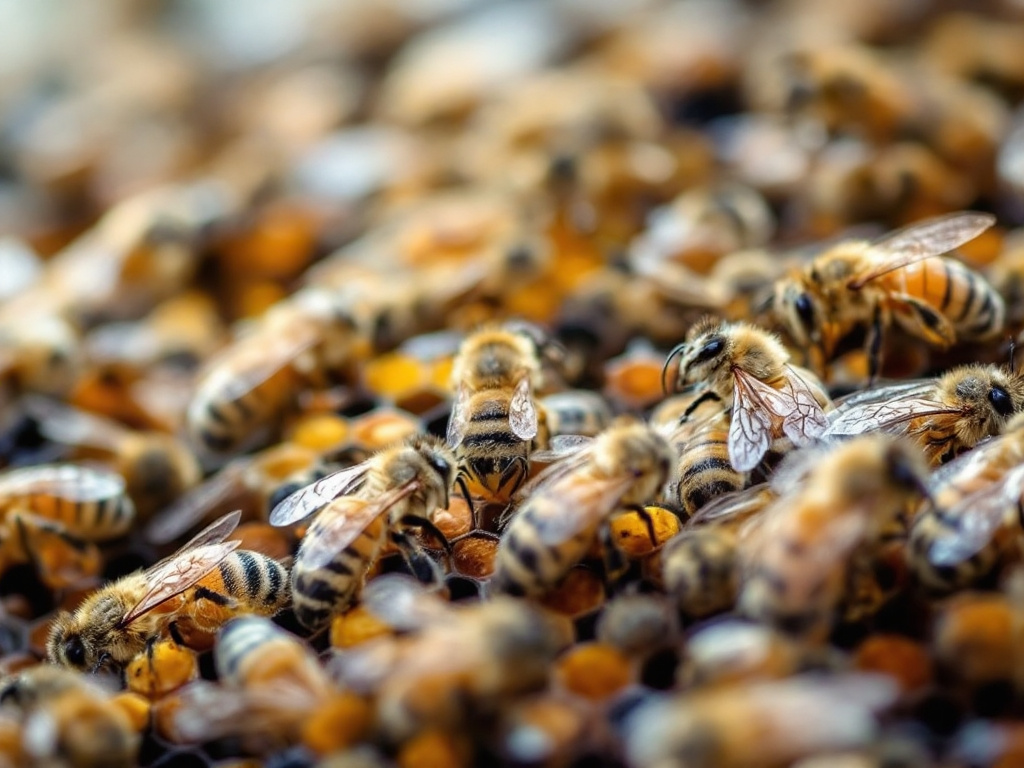Image generated by flux-ai.io & content generated by ChatGPT Version 4o-mini
Honey Bee Health: Tackling Chalkbrood in Gadsden County
Gadsden County, Florida, home to many small farms and a community that values agriculture, faces a challenge that could affect local beekeepers and, ultimately, our food supply. Recent research has shed light on a common but often overlooked issue in honey bee colonies—chalkbrood disease. Understanding this disease is crucial for both beekeepers and anyone interested in the health of our local ecosystem.
What is Chalkbrood?
Chalkbrood is a fungal disease that primarily affects honey bee larvae. When infected, these larvae turn into what are called “mummies,” which can be found in the hive. Imagine finding small, solid clumps that look like chalk—hence the name. These mummies can vary in color from white to dark gray or black, depending on the disease’s progression. While chalkbrood is not usually deadly to entire bee colonies, it can significantly reduce their population and productivity, which is a concern for local farmers and beekeepers.
Why Should Gadsden Residents Care?
Bees play a vital role in pollinating many of the crops that we grow here in Gadsden County, from vegetables to fruits. A decline in bee health can lead to lower yields and even higher prices at the market. If you’re a local farmer or someone who enjoys fresh produce, the health of our bees directly impacts your kitchen table.
Causes and Conditions for Chalkbrood
The subtropical climate of Florida provides ideal conditions for chalkbrood to thrive, especially during periods of high humidity. Poor ventilation within beehives can exacerbate the problem. As a community that often experiences warm and humid weather, it’s crucial for local beekeepers to be aware of these conditions.
Some factors that promote the growth of chalkbrood include:
- High moisture levels: When hives aren’t well-ventilated, moisture can build up, creating a breeding ground for the fungus.
- Cool temperatures: During cooler months, bees may not be as active in cleaning out their hives, allowing the fungus to spread.
- Colony stress: Bees that are stressed—whether from poor nutrition, overcrowding, or other challenges—can be more susceptible to disease.
Management Strategies for Beekeepers
Although there are no chemical treatments for chalkbrood, the research highlights several management strategies that can help control the disease:
- Hygiene: It’s essential for worker bees to remove infected larvae quickly. This is where strong hygiene behavior within the colony becomes important. Beekeepers should ensure they monitor and manage colony health effectively to encourage this behavior.
- Queen Replacement: Replacing the queen with one from a stock that is resistant to chalkbrood can strengthen the colony’s resilience and help improve overall colony health.
- Ventilation: Improving airflow in the hive can help reduce moisture. Simple adjustments, like tilting the hive slightly or placing a block of wood under the outer cover, can make a big difference.
- Nutritional Support: Feeding bees supplemental nutrition can bolster their health and help them resist infections.
A Call to Action for Our Community
For Gadsden County residents, particularly those involved in agriculture, now is the time to pay attention to our bee populations. Beekeepers should regularly check their hives for signs of chalkbrood and implement the strategies outlined above to maintain healthy colonies. Additionally, beekeepers should communicate with local growers and other beekeepers to share information and collaborate on best practices to protect bee health.
As we support our local farmers and strive for a healthy food supply, let’s also remember the crucial role bees play in that equation. A thriving beekeeping community not only benefits individual farmers but enhances our local economy and the environment we cherish. By staying informed and proactive, we can all contribute to the health of our bees and, consequently, the health of our community. For further information and specific management recommendations, beekeepers are encouraged to consult the FDACS-DPI resources available at https://www.fdacs.gov/Agriculture-Industry/Bees-Apiary/Apiary-Inspection.
References
ENY116/AA138: Chalkbrood Recommendations. (n.d.). Ask IFAS – Powered by EDIS. https://edis.ifas.ufl.edu/publication/AA138

